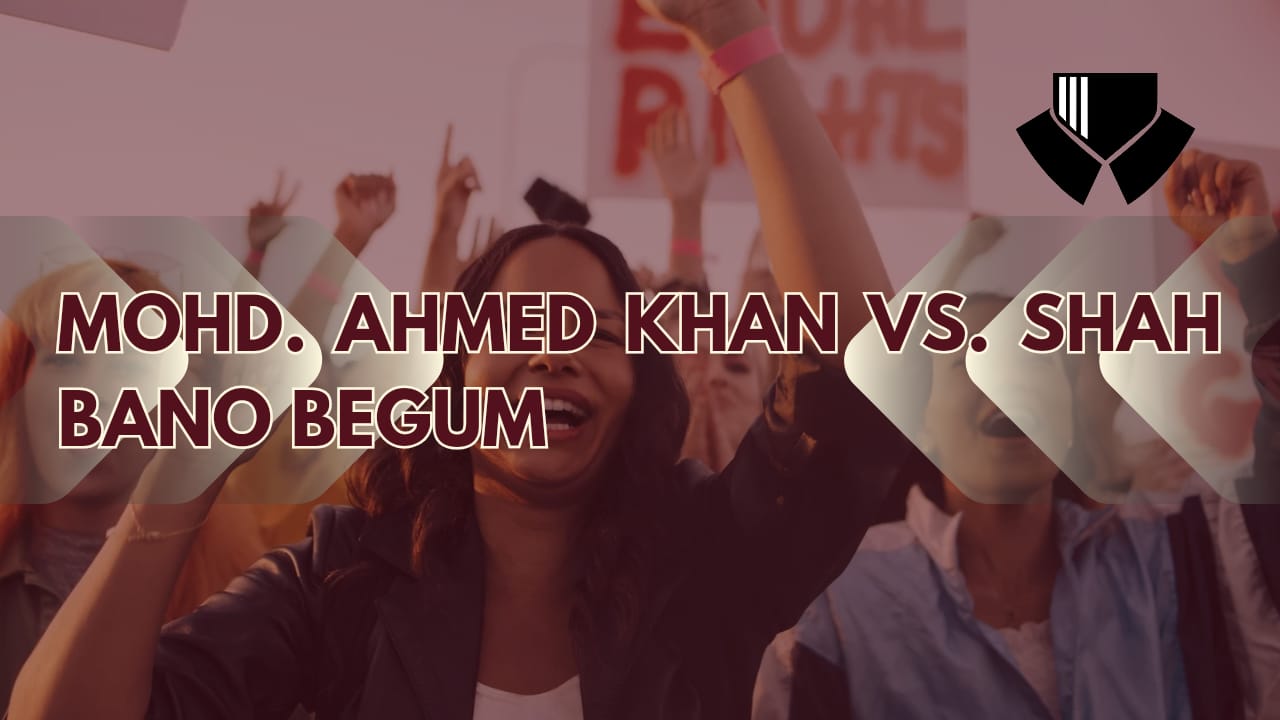This case Analysis is written by Yashasvi Gaur, a 2nd year law student of University of Mumbai.
Citation : Air 1985 Scr (3) 844
Bench : Y.V Chandrachud, D.A Desai, O.Chinnappa Reddy, E.S Venkataramiah, Rangnath
Misra
Date : 23 April, 1985
Introduction
The Shah Bano case, a significant legal precedent in India, concerns Muslim women’s rights with regard to divorce and alimony. The case attracted a lot of attention and has broad ramifications for how personal laws, religious beliefs, and gender justice intersect in India.
Shah Bano, a Muslim woman from Indore, Madhya Pradesh, was divorced by her husband, Mohammed Ahmad Khan, in 1978. Khan stopped giving her with financial support after their divorce, leaving Shah Bano and her five children in a terrible financial situation. Shah Bano sought the courts to request maintenance (financial support) under Section 125 of the Code of Criminal Procedure (CrPC), which provides maintenance for poor widows regardless of their faith.
Facts
Shah Bano was married to Mohd. Ahmed Khan, a lawyer who has been practicing since 1932 and has produced offspring. She and her children were expelled by her husband in 1978. She had no choice but to file a petition for maintenance for both herself and her children in 1978 under Section 125 of the Criminal Procedure Code, 1973. The husband, on the other side, immediately executed an irrevocable talaq to end the marriage. According to Muslim personal law, the husband is only responsible for the wife’s maintenance during the Iddat period. However, he was
directed by the magistrate to pay maintenance of Rs.25 per month to the respondent. Aggrieved by the amount of maintenance, she filed a revision petition to enhance and increase the maintenance. The instant case is a result of an appeal filed by the husband, Mohd. Ahmed Khan, seeking the dismissal of a petition filed by his aggrieved wife who prayed for an increase in the amount of maintenance.
Issues
- Whether the “WIFE” definition includes a divorced Muslim woman?
- Whether it overrides personal law?
- Whether a Muslim husband’s obligation to provide maintenance for a divorced wife is in or not in the conflict between section 125 and Muslim Personal Law?
- What is the sum payable on divorce? The meaning of Mehar or dower is not summed payable on divorce?
Contention of petitioner
- Maintenance under the Muslim Personal Law Board: The petitioner argued that the Muslim Personal Law Board was responsible for providing maintenance to Muslim women and that the civil courts did not have jurisdiction to award maintenance to Muslim women under the Muslim Personal Law.
- Shariah Law: The petitioner contended that the principles of Shariah Law, as interpreted by the Muslim Personal Law Board, did not permit a Muslim husband to provide maintenance to his divorced wife beyond the period of iddat (three months after the divorce).
- Interpretation of the Quran: The petitioner argued that the Quran did not require Muslim husbands to provide maintenance to their divorced wives beyond the period of iddat.
- Constitutional validity of Section 125 of the Criminal Procedure Code: The petitioner contended that Section 125 of the Criminal Procedure Code, which provides for the payment of maintenance to wives, children, and parents, was unconstitutional as it violated the principles of personal law.
- Discrimination against Muslim husbands: The petitioner argued that requiring Muslim husbands to provide maintenance to their divorced wives beyond the period of iddat would amount to discrimination against Muslim husbands, as it was not required of husbands belonging to other religions.
Contention of Respondent
Respondent’s contention was that the Muslim Women (Protection of Rights on Divorce) Act, 1986, which sought to overturn the Supreme Court’s decision in the case, was constitutional and necessary to protect the rights of Muslim women.
The respondent argued that the Quranic injunctions on maintenance and divorce should be interpreted in a manner that is compatible with modern-day principles of justice and equity. They contended that the Act was in line with the Quranic injunctions and aimed to ensure that Muslim women were not left destitute after divorce.
The respondent further argued that the Act did not violate the principles of secularism as enshrined in the Indian Constitution, as it was intended to protect the fundamental rights of Muslim women. They also contended that the Act did not discriminate against Muslim men, as they were still required to provide maintenance to their divorced wives in accordance with the Quranic injunctions.
Overall, the respondent’s contention was that the Muslim Women (Protection of Rights on Divorce) Act, 1986 was a necessary step towards ensuring gender equality and justice for Muslim women, and that it did not violate the principles of secularism or discriminate against Muslim men.
Judgment
The Supreme Court ruled that Section 125(3) of the Code of Criminal Procedure applies to Muslims without any form of discrimination because it applies to all citizens regardless of their religion. In addition, the court ruled that if there is a disagreement between personal law and
section 125, section 125 will take precedence. It is made plain that there is no conflict between Section 125’s rules and the Muslim Personal Law’s regarding the Muslim husband’s need to pay maintenance for a divorced wife who is unable to support herself. .
Supreme Court in this case duly held that since the obligation of Muslim husband towards her divorced wife is restricted to the degree of ” Iddat” period, indeed though this circumstance does not contemplate the rule of law that’s said in Section 125 of CrPc., 1973 and subsequently the obligation of the husband to pay maintenance to the wife extends beyond the iddat period in the event that the wife does not have sufficient means to maintain herself. It was further stated by the court that this rule according to Muslim Law was against humanity or was wrong because here a divorced wife was not in a condition to maintain herself.
The payment of Mehr by the husband on divorce is not sufficient to exempt him from the duty to pay maintenance to the wife.
After a protracted legal process, the Supreme Court ultimately came to the conclusion that if a divorced wife is competent to support herself, the husbands’ legal duty will stop. The position will be reversed, however, if the woman is unable to support herself after the Iddat term and qualifies for maintenance or alimony under Section 1125 of the CrPC.
Conclusion
The Shah Bano case continues to be a contentious and important part of the ongoing discussion in India about personal laws, gender equality, and religious freedom. It draws attention to the conflict that exists in a multicultural, multireligious nation like India between secular legal concepts and religious practices. The case also serves as a reminder of the fight for women’s rights and the necessity of striking a balance between religious freedom and the defense of everyone’s basic rights.


